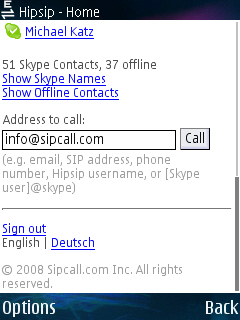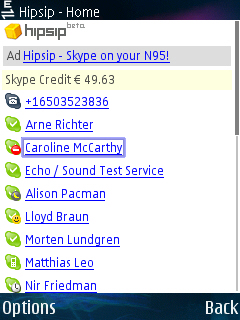Screenshot from the Hipsip mobile website.
One big difference is that Hipsip has no hosted bridge from the cell phone network to Skype. Your computer must always be switched on and you have to install a small software called Hipsip Bridge which has to be running together with Skype. Otherwise the mobile website on the phone says "Please connect your Hipsip Bridge to see your Skype contacts." That is a big disadvantage to the other mobile phone Skype services like iSkoot, Mobivox and Fring. But at least it's cheaper than ideas from SkyQube or VoSky. They not only require you to leave your computer running, but also to buy an extra hardware which hands your mobile phone calls over to Skype. Again, they also let you receive Skype calls on a cell phone.
Call your Skype contacts with one click on a hyperlink.
If the Hipsip Bridge doesn't run, you can still call every SIP address of choice or even email addresses, which will be explained later. I conducted a small email interview to the developer Christian Rees. He comes from Germany himself, where he long time ago used to write about Atari ST computers for the famous c't magazine. On the phone he had told me that they are already considering a hosted solution without Hipsip Bridge, but that's not so easy.
I see that you use HTML code like <a href="tel:+4940306988028">Call sip:johndoe@ipcall.com</a> on your mobile website. What does it do? A computer's browser doesn't know what to do with it, but a cell phone starts a call.
The answer is, that the so called telephone URL, tel:, is supported on converged devices (in the sense that they support circuit and packet data) like cell phones with a web browser. When a tel: URL link with a phone number is clicked in the browser, the phone starts dialing the number. It works on all phones that are less then 4 years old. It's customary for the phone to prompt the user with the number, as a safeguard. Our users can be assured that we are only returning our local callthrough numbers.
Who is the company behind the Hipsip offer, Sipcall.com?
Sipcall.com Inc., the parent of Hipsip, is a California corporation with offices in Menlo Park. The company was founded in 2004, is privately funded and in the process of raising more capital. We are less then 10 people with backgrounds from academia, VoIP and the mobile industry. We consider ourselves an international company, that happens to be located in Silicon Valley.
Our history goes back quite a bit, starting in 1999, with the idea that email addresses will eventually turn into phone numbers. We attempted to raise funding in 2000, targetting the mobile space already back then. However, it took until 2004 for the climate to be right to start again with new ideas. In early 2005 we began developing the Hipsip Bridge for Skype. Due to our funding situation back then, it has taken until now for the relase.
What are your further plans?
We are planning to make Hipsip more useful and convenient for our users. One priority is to improve the Skype experience. We have already put emphasis on providing ISDN like voice quality for Skype calls over SIP, since Skype is so exceptional in this respect and we don't want to loose too much of that. However, there are limitations to the current phone networks. We are not so hot on vaporware, so we'll announce new features when they are available. And we are very interested to hear from users what they need.
When will it be hosted, so that my computer doesn't need to stay switched on?
See above, but it is a high priority for us.
And what about new features?
One novel feature that we provide is EmailCall. With EmailCall, a user can turn their email address into their phone number, so to speak. This is how it works: if the user has verified his mobile number and email address and opts-in to EmailCall, he can now be called by his email address:The idea behind this is, that we will eventually see a convergence in the addressing space just as we are seeing it with networks becoming all IP, so that a single SIP/email/URI address will be sufficient for all the different modes of communications for which we have to remember identifiers today. This day is not here yet, but we believe that it will eventually happen. Today it is already possible to dial a URI on the Nokia N-Series and E-Series phones, which works very well over WLAN and 3G. Things will only improve when pure packet networks like Wimax and LTE come online.
- by dialing the email address on any SIP phone registered on Hipsip, which will ring the users SIP devices (you could say we are sippyfying the email address).
- from any mobile phone by entering the URL: hipsip.com/john.doe@aol.com (as an example). When the URL is entered, the current mobile number of the owner of the email address will be returned. This is limited to other users of Hipsip, and is strictly an opt-in feature. The user can change his current number anytime, while the much easier to remember email address can be used to look it up in real time, and dial immediately.
My take: we have to wait and see how Hipsip develops. The market for such services is already crowded. But nobody has built yet the perfect bridge from Skype to SIP. Hipsip has potential if they get the service hosted, but then they would have to cover higher server costs. The EmailCall is funny but nothing new. Jangl already does it for nearly a year.
Side note:
Respect to blogger hero Russell Shaw who unexpectedly passed away last weekend when he was on his way to cover the Emerging Technologies Conference and VON.

